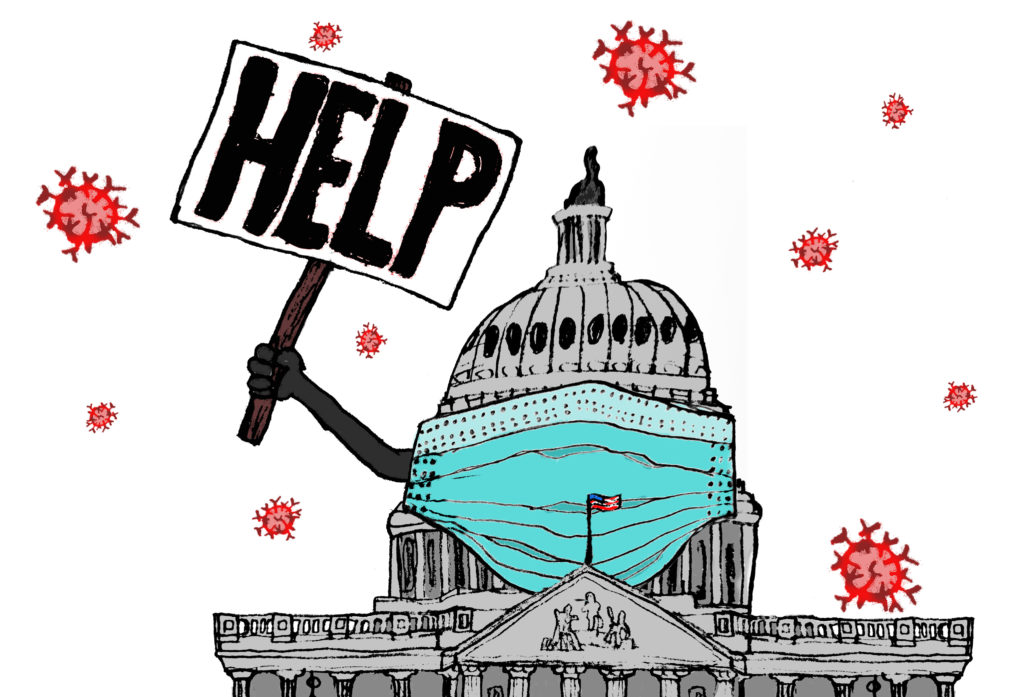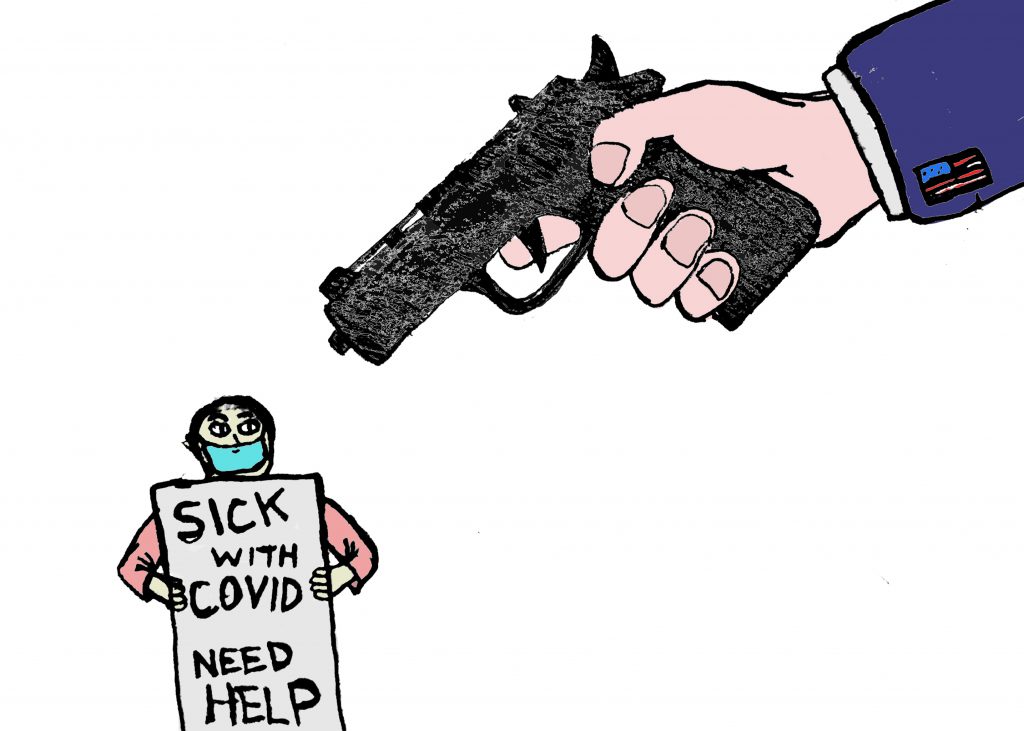To evaluate the inter-agency response to the recent Covid-19 pandemic, the U.S. Senate Committee on Homeland Security and Governmental Affairs issued a hearing on March 5, 2020 to inquire on the nation’s protocol for biological disasters. The hearing was chaired by Senator Ronald Johnson (R-WI) and ranking member Gary C. Peters (D-MI), who introduced two senior officials tasked with representing their respective agencies. In compliance with committee procedure, the officials had ten minutes to brief the panel on recent developments before answering policy concerns for the rest of the hearing.
By this time, the World Health Organization had confirmed 95,324 Covid-19 cases globally, with the United States sharing 221 cases among 21 states.[1] In lieu of this circumstance, the expressed purpose of the committee (outlined by Sen. Peters) was to encourage a proactive relationship between federal and state administrators. Part of this decision came from Sen. Johnson’s concern that a stronger executive intervention would worsen “the costs of overreaction.”
An initial portion of the inquiry surrounded concerns over quarantining measures among airports, seaports, and points-of-entry along the U.S/Canadian border. Kenneth T. Cuccinelli, the Acting Deputy Secretary of Homeland Security, testified that the department would actively engage with the Centers for Disease Control (CDC) in enforcing 212(f) of the Immigration and Nationality Act. The provision authorizes the President to restrict immigration through an official proclamation, which would supposedly assist efforts to limit sick foreign nationals entering from Canada and their 11 quarantine-designated airports.[2]
While U.S. Customs and Border Protection (CBP) conducted medical screenings for border travelers, however, Sec. Cuccinelli noted that the agency had not been up to par in anti-contamination measures. The testimony revealed that CBP personnel were not medically trained and had to rely on their own judgment before consulting CDC officials remotely.
A larger portion of the inquiry surrounded biodefense strategies and the Strategic National Stockpile (SNS), which acts as the nation’s emergency repository for critical medical supplies. Robert Kadlec M.D., the Assistant Secretary for Preparedness & Response at Health and Human Services (HHS), acknowledged that they were not prepared to keep up with demand despite identifying capability gaps on resource investments back in 2015. Part of this, Sec. Kadlec argued, stemmed from a lack of infrastructure for medical countermeasures (e.g. domestic production of vaccines) and low appropriations funding for FY2020.
In response, HHS recommended alternative quarantining measures such as home isolation and “social distancing” protocols regulated by state officials. The hearing introduced a request for 500 million M95 respirators as states had already utilized their medical supply lines; several of which have contacted SNS with a supply backorder until May.
Multiple committee members prioritized the socioeconomic consequences of a national quarantine, such as healthcare affordability, hospital reimbursements, paid sick leave, health precautions for undocumented immigrants, and the role of SNAP and TANF. Financial vulnerabilities were expressly highlighted on state and local welfare programs under the 1998 Stafford Act, a federal law that affords financial relief for natural disasters (how this applies to a medical crisis will likely be determined by what legally constitutes as “natural”). Sec. Cuccinelli clarified that the funding distributed by the Federal Emergency Management Agency (FEMA) could not be legally applied to school closures, senior centers, or home-delivered meal programs.
To give DHS and HSS credit, the proposals were “practical” in minimizing migration patterns. Strictly narrowing the inquiry to medical progress would have been inappropriate since a vaccine for Covid-19 would not enter mass-distribution for another 12-18 months, according to Sec. Kadlec. By primarily focusing on human migration and the transportation of medical goods, the inquiry was able to assess inter-agency responses by the CDC, FDA, the U.S. Coast Guard, and others all within a confined amount of time.
My strongest criticism to the hearing is placed on the committee’s partisan agenda-setting. Utilizing the chairmanship to set the precedent of the inquiry, Sen. Johnson defended the administration’s shortcomings by placing Covid-19 in a “proper perspective” with the seasonal flu. Undermining the faults and the virus itself had caused a number of Senators to hesitate on constructive criticism that would have otherwise minimized misuse of department resources.
Some of the committee’s defense for DHS had also conflicted with their regard for state’s rights. Enforcing 212(f), for example, does not place any legal limits on the president’s authority to restrict migration on state borders indefinitely, which would arguably violate dual sovereignty recognized under Printz v. United States (1997).[3]
Although the panel serves as the Senate’s chief oversight, the discussions were not always focused to the committee’s scope of supervision. Two members – Sen. Jacklyn Rosen (D-NV) and Sen. Kamala Harris (D-CA) – pressed the senior officials on matters such as labor rights and “teleworking” (i.e. working from home), which were clearly out of Sec. Cuccinelli and Sec. Kadlec’s line of expertise. Several questions that were refrained from being answered may have been more relevant for the Senate Appropriations Committee, Joint Economic Committee, and the Committee on Health, Education, Labor, and Pensions. Based on these instances, the hearing has not been efficient on overseeing these agencies.
One modification I would make to the committee procedure going forward would be to give Senators leverage in deliberating policy recommendations with department officials. Suggestions by Sen. Peters, Sen. Josh Hawley (R-MO), and Sen. Kyrsten Sinema (D-AZ) would have made the inquiry more insightful had they allowed themselves to devote more time on the subject and permitted Sec. Cuccinelli and Sec. Kadlec to voice their input.
Likewise, the bills would have received the appropriate peer review to remedy the subpar response already addressed by the hearing. The policies referenced include the Medical Supply Chain Security Act (S.3343), which would require unit-level traceability on medical devices to detect stockpile shortages; and the Healthcare Workforce Protection Act (S.3372), which protects healthcare workers under new provisions of the Occupational Safety and Health Administration (OSHA).[4][5]
In summary, the Senate Committee on Homeland Security and Governmental Affairs was able to fundamentally address primary concerns Covid-19 presents to national security and the national healthcare system within the federal government’s current limitations. While it is unlikely that committee members will become impartial to policy making, future hearings can maximize their ability to provide oversight by collaborating with agency needs rather than strictly probing them.
Work Cited
[1] “Novel Coronavirus (2019-NCoV) Situation Reports.” World Health Organization,
World Health Organization, 5 Mar. 2020, 10:00, www.who.int/emergencies/diseases/novel-coronavirus-2019/situation-reports/.
[2][3] “Scope and History of Section 212(f) Presidential Authority to Suspend/Restrict Entry by Proclamation.” Myattorneyusa, My Attorney USA, 2020,
http://myattorneyusa.com/scope-and-history-of-section-212f-presidential-authority-to-suspendrestrict-entry-by-proclamation
[3] “S. 3372: Health Care Workforce Protection Act of 2020.” GovTrack.us, GovTrack, 2 Mar. 2020, www.govtrack.us/congress/bills/116/s3372/text.
[4] Hawley, and Josh. “S.3343 – 116th Congress (2019-2020): Medical Supply Chain Security Act.”
Congress.gov, 27 Feb. 2020, www.congress.gov/bill/116th-congress/senate-bill/3343.



